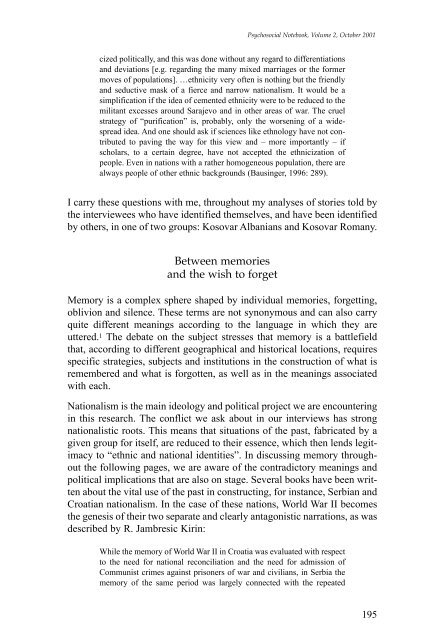Psychosocial Notebook - IOM Publications - International ...
Psychosocial Notebook - IOM Publications - International ...
Psychosocial Notebook - IOM Publications - International ...
You also want an ePaper? Increase the reach of your titles
YUMPU automatically turns print PDFs into web optimized ePapers that Google loves.
cized politically, and this was done without any regard to differentiations<br />
and deviations [e.g. regarding the many mixed marriages or the former<br />
moves of populations]. …ethnicity very often is nothing but the friendly<br />
and seductive mask of a fierce and narrow nationalism. It would be a<br />
simplification if the idea of cemented ethnicity were to be reduced to the<br />
militant excesses around Sarajevo and in other areas of war. The cruel<br />
strategy of “purification” is, probably, only the worsening of a widespread<br />
idea. And one should ask if sciences like ethnology have not contributed<br />
to paving the way for this view and – more importantly – if<br />
scholars, to a certain degree, have not accepted the ethnicization of<br />
people. Even in nations with a rather homogeneous population, there are<br />
always people of other ethnic backgrounds (Bausinger, 1996: 289).<br />
I carry these questions with me, throughout my analyses of stories told by<br />
the interviewees who have identified themselves, and have been identified<br />
by others, in one of two groups: Kosovar Albanians and Kosovar Romany.<br />
Between memories<br />
and the wish to forget<br />
<strong>Psychosocial</strong> <strong>Notebook</strong>, Volume 2, October 2001<br />
Memory is a complex sphere shaped by individual memories, forgetting,<br />
oblivion and silence. These terms are not synonymous and can also carry<br />
quite different meanings according to the language in which they are<br />
uttered. 1 The debate on the subject stresses that memory is a battlefield<br />
that, according to different geographical and historical locations, requires<br />
specific strategies, subjects and institutions in the construction of what is<br />
remembered and what is forgotten, as well as in the meanings associated<br />
with each.<br />
Nationalism is the main ideology and political project we are encountering<br />
in this research. The conflict we ask about in our interviews has strong<br />
nationalistic roots. This means that situations of the past, fabricated by a<br />
given group for itself, are reduced to their essence, which then lends legitimacy<br />
to “ethnic and national identities”. In discussing memory throughout<br />
the following pages, we are aware of the contradictory meanings and<br />
political implications that are also on stage. Several books have been written<br />
about the vital use of the past in constructing, for instance, Serbian and<br />
Croatian nationalism. In the case of these nations, World War II becomes<br />
the genesis of their two separate and clearly antagonistic narrations, as was<br />
described by R. Jambresic Kirin:<br />
While the memory of World War II in Croatia was evaluated with respect<br />
to the need for national reconciliation and the need for admission of<br />
Communist crimes against prisoners of war and civilians, in Serbia the<br />
memory of the same period was largely connected with the repeated<br />
195

















